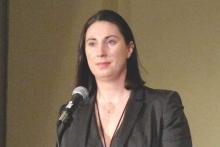BOSTON – Recurrence rates of cancer following breast-conserving surgery for ductal carcinoma in situ differ significantly with patient age, with younger women having a three-fold higher 10-year recurrence rate than older women.
The lower risk for 10-year recurrence among older women was independent of whether they had received adjuvant radiation therapy, reported Dr. Patricia A. Cronin, a surgical fellow at Memorial Sloan Kettering Cancer Center in New York City.
“Women over 80 are at low risk of recurrence, even in the absence of adjuvant therapies, whilst young age is a highly significant risk factor for any recurrence, in particular invasive recurrence, and therefore age is an important factor that should be weighed when considering other treatment options, including surgical options and adjuvant therapy,” she said at the annual Society of Surgical Oncology Cancer Symposium.
Ductal carcinoma in situ (DCIS) now accounts for more than 20% of all breast cancers. It can be treated with breast conserving surgery (BCS) alone or in conjunction with adjuvant therapy, radiation, and endocrine therapy, or by mastectomy.
“All treatment options have excellent survival but there can be markedly different recurrence rates,” Dr. Cronin said.
She noted that age is recognized as a risk factor for recurrence after BCS for DCIS, an observation confirmed in radiotherapy trials, but added that “the full nature of the relationship between age and recurrence and its interaction with other factors is not clear.”
DCIS through the ages
To get a better handle on the effect of age on recurrence, the investigators looked at data on patients who underwent breast-conserving surgery from 1978 through 2010. The women were stratified by age into six categories, beginning with those under age 40 and continuing at 10-year increments to age 80 and older.
Clinical, pathological, and treatment factors included in the analysis were family history, clinical vs. radiologic presentation, nuclear grade, necrosis, number of excision, margin status, radiotherapy, endocrine therapy, and treatment period.
Outcomes included ipsilateral DCIS recurrence, ipsilateral invasive breast cancer, ipsilateral axillary node recurrence, and distant recurrence in the absence of both ipsilateral recurrence and contralateral breast cancer.
A total of 2,996 women were identified, 363 of whom (12%) had local recurrences, either as DCIS in 192 patients, invasive disease in 160, of unknown status in 11.
An analysis of recurrence rates by age showed decreasing risk with each advance in age category, compared with women under age 40, with women aged 40-49 having a hazard ratio (HR) of 0.68 (P = .05), and women age 80 and over having an HR of 0.34 (P = .01), with 10-year recurrence rates ranging from 27% in the youngest cohort to about 8% in the oldest (log rank P less than .0001 for the overall effect of age on recurrence).
Looking at the individual factors associated with age, women under age 40 had a significantly higher proportion of clinical vs. radiologic presentation, with either a mass, nipple discharge, or Paget disease. Younger women also had less endocrine therapy.
Older women less frequently underwent multiple excisions, and more frequently had close or positive surgical margins, as well as lower rates of adjuvant therapy, and less endocrine therapy than women in the middle-age categories.
In a multivariable analysis for recurrence risk by age controlling for presentation, family history, necrosis, excision number, margin status, adjuvant radiation, endocrine therapy, and treatment period, the association between age and risk remained significant beginning in patients aged 50-59 (HR, 0.46; P = .0005) and continuing to dwindle through the decades to those age 80 and older (HR, 0.21; P = .001).
Age was also significantly associated with recurrence both among who received radiation and those who did not.
Women under age 40 were also found to be at greater risk for invasive recurrences, with 15.8% of all patients in this age group having invasive recurrences, and 11.5% having recurrent DCIS. In contrast, among all women aged 80 and older, 3.2% had invasive recurrences, and 3.4% had recurrent DCIS.
Question of mammography
Following Dr. Cronin’s presentation, Dr. Nicholas Tranakas from Broward Health Medical Center in Fort Lauderdale, Fla., asked whether, since the evidence shows that the majority of younger patients do not have indolent disease, they should be screened with mammography at earlier age than current guidelines recommend.
Dr. Cronin noted that although women under 40 don’t routinely undergo screening, “you can see that most patients under 40 present clinically, and therefore it’s hard in this study to make any recommendations in regards to screening.”
Asked how she counsels younger patients, she noted that although the data on recurrence risk in younger women are provocative, overall survival rates are excellent for both breast-conserving procedures and mastectomy, and the decision about which procedure to choose may rely on the patient’s degree of aversion to risk.


